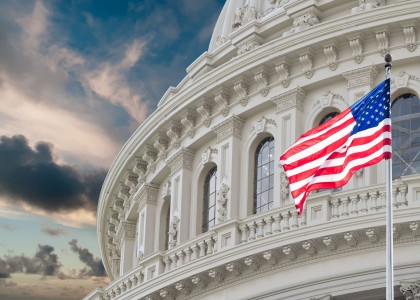Some states have code collaboratives to address barriers to implementing updated building energy codes. The new National Energy Codes Collaborative is a nationwide effort to help jurisdictions lower energy costs and cut carbon pollution through more energy-efficient buildings.
The National Energy Codes Collaborative is a new nationwide network to help states and jurisdictions effectively and sustainably implement updated building energy codes, driving innovation through convening and collaboration, technical assistance, community engagement, capacity building, and thought leadership. By providing this support and connecting states and localities facing similar challenges across the U.S., our goal is to see more states and localities on the path to regularly updating their energy codes, resulting in the widespread improvements in energy efficiency.
Nearly a hundred energy code leaders and key stakeholders from across the United States came together in Sacramento in early May to kick off the Codes Collaborative. Led by ACEEE and its partners—the National Association of State Energy Officials (NASEO), the Urban Sustainability Directors Network (USDN), and ASHRAE—the Codes Collaborative brings together states and local jurisdictions and the organizations that support them in implementing updated energy codes across the country. The 27 projects funded under the Department of Energy’s Resilient and Efficient Codes Implementation (RECI) program connect with each other through the Codes Collaborative. The 2021 bipartisan infrastructure law provided $225 million over five years to the RECI program for states and localities to update their building codes, and with an additional $1 billion from the Inflation Reduction Act to support updated energy codes, this is just the beginning.
Convening Diverse Stakeholders
The Codes Collaborative provides a structure for states and jurisdictions—and the local, state, regional, and national organizations that support implementation of their energy codes—to connect across the country to share resources, best practices, and lessons learned. We are setting up online communication and collaboration platforms for Collaborative members and affiliates and will host quarterly virtual meetings.
While virtual spaces are essential to a national effort in this age, they are no substitute for meeting in person to explore ideas and make new connections. So, we will be hosting annual in-person meetings, as well as events at annual convenings of relevant national organizations (NASEO, USDN, ASHRAE, and the International Code Council) to reach key stakeholders and bring new members into the Collaborative.
Launching Technical Advisory Groups
The Collaborative will facilitate topic-based technical advisory groups (TAGs) to:
- provide thought leadership and strategic direction for state and local members,
- identify needs to be addressed by technical assistance,
- inform and review Collaborative resources, and
- peer review resources from the Department of Energy’s Building Energy Codes Program and RECI project teams.
We have launched TAGs on the following topics:
- Equitable energy code implementation
- Workforce development
- Code official engagement and training
- Best practices for statewide implementation
- Community engagement
- Coordinating energy codes and building performance standards
We will roll out additional TAGs based on members’ priority areas, potentially including stretch codes (local codes that are more stringent than a state’s base code), adoption support, remote and rural jurisdictions, field studies, local adoption and implementation in home rule states, and benefits other than energy savings, such as resilience and improved health outcomes.
TAG meetings will be held virtually every 6–8 weeks with experts in these topic areas and Collaborative state and local members. We especially look to engage state and local officials who can gain from the expertise and experience of those leading and participating in the TAGs.
Piloting Capacity-Building and Fellowship Programs
The Codes Collaborative includes three pilot programs to build capacity at the state and local levels while forging new connections and expanding the codes community. This includes launching an Energy Code Implementation (ECI) Fellowship program for experienced practitioners or community-based organizations, funding them to take on leadership roles at the state, regional, or national level while continuing their practices.
- The in-state capacity-building program includes steps to develop a roadmap to effectively implement an energy code update. An ECI Fellow will be recruited among experienced practitioners meeting the state’s expertise and capacity needs.
- Cross-Jurisdictional ECI Fellows will be recruited to support Collaborative member jurisdictions with common needs. For example, based on members’ priorities, fellows could include an engineer or architect with expertise in high-efficiency and/or all-electric buildings in cold climates, a consultant experienced in navigating code adoption in states where localities set building codes, or a community organizer working to ensure equitable outcomes in stretch code adoption.
- The Collaborative includes a fund and process for short-term technical assistance contracting to provide limited, targeted, timely technical assistance in response to immediate needs of Collaborative members. The fund is open to the Collaborative’s state and local agency members to help streamline procurement of technical services.
These programs will be rolled out over the summer, so interested state and local agencies should contact us and join the Collaborative.
Looking Ahead
Collaborative participants have highlighted some key ideas that will shape our work going forward:
- “Who needs to be in the room?” and “Who do we need to reach?” – Key to stakeholder engagement will be differentiating between who we need to work to bring into the Collaborative itself and who Collaborative leaders and members need to reach with their efforts, as well as possible approaches to do so (e.g., resources to support state, local, and community participation).
- “Early wins” – Identify areas where we can have immediate impact to keep those already engaged inspired and pique the interest of others.
- “Timely” and “In real time” – Focus on issues and challenges that are present for states and jurisdictions right now, and share lessons learned from current projects as they proceed (i.e., not through retrospectives at the end).
- “Commonalities and gaps” – Look across RECI projects to identify commonalities that can inform each other and gaps that the Collaborative can help fill.
- “Human impacts at scale” – Focus on positive impacts on individuals that become measurable when scaled.
- “Minimize reinventing the wheel” – Focus on what’s proven to be successful, work to expand and scale up those efforts elsewhere, and avoid developing entirely new models.
There will be more to come as the National Energy Codes Collaborative progresses on the areas outlined here. You can also find out more as we build out our website and sign up to stay informed or become a member.



